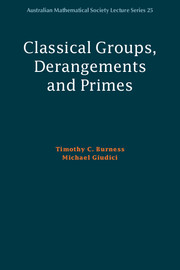Book contents
4 - Subspace actions
Published online by Cambridge University Press: 18 December 2015
Summary
Introduction
In this chapter we begin our study of derangements of prime order in finite primitive classical groups. Let G ≤ Sym(Ω) be a primitive almost simple classical group over Fq with point stabiliser H. Let T denote the socle of G, let V be the natural module for T and write q = pf, where p is a prime. We may assume that n and q satisfy the conditions in Table 3.0.1, where n = dim V. Let r be a prime divisor of |Ω|, and recall that G is r-elusive if it does not contain a derangement of order r (see Definition 1.3.6).
Here we focus on the special case where Ω is a set of isometric subspaces (or appropriate pairs of subspaces) of V. In terms of Aschbacher's subgroup structure theorem (see Section 2.6.1), H is a maximal subgroup of G in the collection (recall that we follow [86] in defining the subgroups in, which differs slightly from Aschbacher's original set-up in [3]). The specific cases we will consider are listed in Table 4.1.1, where we adopt the abbreviations t.i., n.d., t.s. and n.s. for the terms totally isotropic, nondegenerate, totally singular and nonsingular, respectively. (Recall that a nonsingular 1-space is a subspace spanned by a nonsingular vector.) Furthermore, if T is an orthogonal group and Ω consists of nondegenerate subspaces then we say that Ω is hyperbolic, elliptic or parabolic according to the particular type of the subspaces comprising Ω (see Section 2.2.5). The degrees of the primitive groups listed in Table 4.1.1 are easily computed from the information in [86, Section 4.1], and they are recorded in Table 4.1.2.
Throughout this chapter we continue to adopt the notation introduced in Chapters 2 and 3 for classical groups and their elements.
Remark 4.1.1 In Cases I' and I" of Table 4.1.1, T = PSLn(q), n ≥ 3 and Ω is the set of pairs of proper subspaces ﹛U,W﹜ of V with the stated properties (note that the given conditions imply that dim U < n/2 in Case I"). In these two cases, T is transitive on Ω and the corresponding stabilisers are maximal subgroups of G if and only if G ≰ PΓLn(q).
- Type
- Chapter
- Information
- Classical Groups, Derangements and Primes , pp. 149 - 195Publisher: Cambridge University PressPrint publication year: 2016



